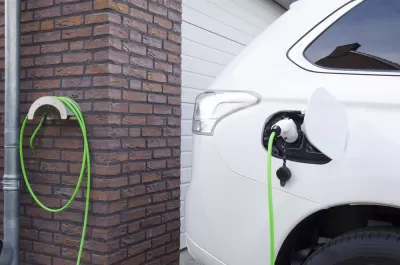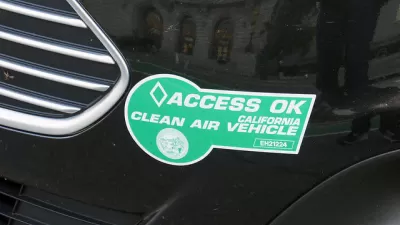The U.S. EPA has signaled that it will withdraw an earlier decision to maintain the 54.5 miles per gallon target. Should that happen, a major casualty will be electric vehicles, according to one prominent EV advocate interviewed on NPR.

Electric vehicle advocate Chelsea Sexton, co-founder and former executive director of Plug In America, warns that electric vehicle sales are already vulnerable even without the predicted regulation change by the U.S. Environmental Protection Agency and U.S. Department of Transportation. They "are still heavily dependent on external regulation," she tells Sonari Glinton, NPR business correspondent [audio available].
Sexton, known for her role in the 2006 documentary, Who Killed the Electric Car?, agrees with Glinton's assessment of the auto industry's preference for larger, conventional vehicles.
When Chevy makes a Silverado, they make thousands of dollars. When they make a Chevy Volt, they lose money.
"And in fact, even some of the more aggressive automakers are likely to roll back their [EV] plans," adds Sexton.
Glinton makes one notable exception: auto manufacturer Tesla. Unlike many other EVs on the road in California, which has a rigorous zero emission vehicle requirement, Teslas are not 'compliance vehicles.'
Relaxing federal fuel efficiency standards
The Natural Resources Defense Council's energy and transportation director, Roland Hwang, tells Glinton that the E.P.A. has to go through a formal process to relax the fuel efficiency standards.
They have to notify, allow public comment before they actually issue a decision. And then we'll see them in court.
[Coral Davenport of The New York Times explained the process: "After withdrawing the Obama administration’s requirement for model years 2022 through 2025, the Trump administration will have a year to put forth an alternative set of efficiency standards.]
"Reversing the E.P.A. and the Department of Transportation rules could take as long as two years," adds Glinton. "Hwang says walking back the rules will have unintended consequences."
And frankly, what it's going to do is it's going to throw the auto industry into chaos. To unwind these standards will be a years-long battle in the courts.
Glinton ends his report on a hopeful note for EV enthusiasts, but not on a federal level. Perhaps no state has embraced electric vehicles as California has done under Gov. Jerry Brown and the state's Air Resources Board under the leadership of Mary Nichols, which has set a target of 1.4 million zero emission vehicles on California roads by 2025. The governor set his own target of 1.5 million ZEVS by that date.
However, even those goals may be imperiled if EPA Administrator Scott Pruitt withdraws a waiver that allows the state to set its own emissions standards.
FULL STORY: How Administration Regs Could Affect The Future Of The Electric Car

Maui's Vacation Rental Debate Turns Ugly
Verbal attacks, misinformation campaigns and fistfights plague a high-stakes debate to convert thousands of vacation rentals into long-term housing.

Planetizen Federal Action Tracker
A weekly monitor of how Trump’s orders and actions are impacting planners and planning in America.

San Francisco Suspends Traffic Calming Amidst Record Deaths
Citing “a challenging fiscal landscape,” the city will cease the program on the heels of 42 traffic deaths, including 24 pedestrians.

Defunct Pittsburgh Power Plant to Become Residential Tower
A decommissioned steam heat plant will be redeveloped into almost 100 affordable housing units.

Trump Prompts Restructuring of Transportation Research Board in “Unprecedented Overreach”
The TRB has eliminated more than half of its committees including those focused on climate, equity, and cities.

Amtrak Rolls Out New Orleans to Alabama “Mardi Gras” Train
The new service will operate morning and evening departures between Mobile and New Orleans.
Urban Design for Planners 1: Software Tools
This six-course series explores essential urban design concepts using open source software and equips planners with the tools they need to participate fully in the urban design process.
Planning for Universal Design
Learn the tools for implementing Universal Design in planning regulations.
Heyer Gruel & Associates PA
JM Goldson LLC
Custer County Colorado
City of Camden Redevelopment Agency
City of Astoria
Transportation Research & Education Center (TREC) at Portland State University
Jefferson Parish Government
Camden Redevelopment Agency
City of Claremont



























